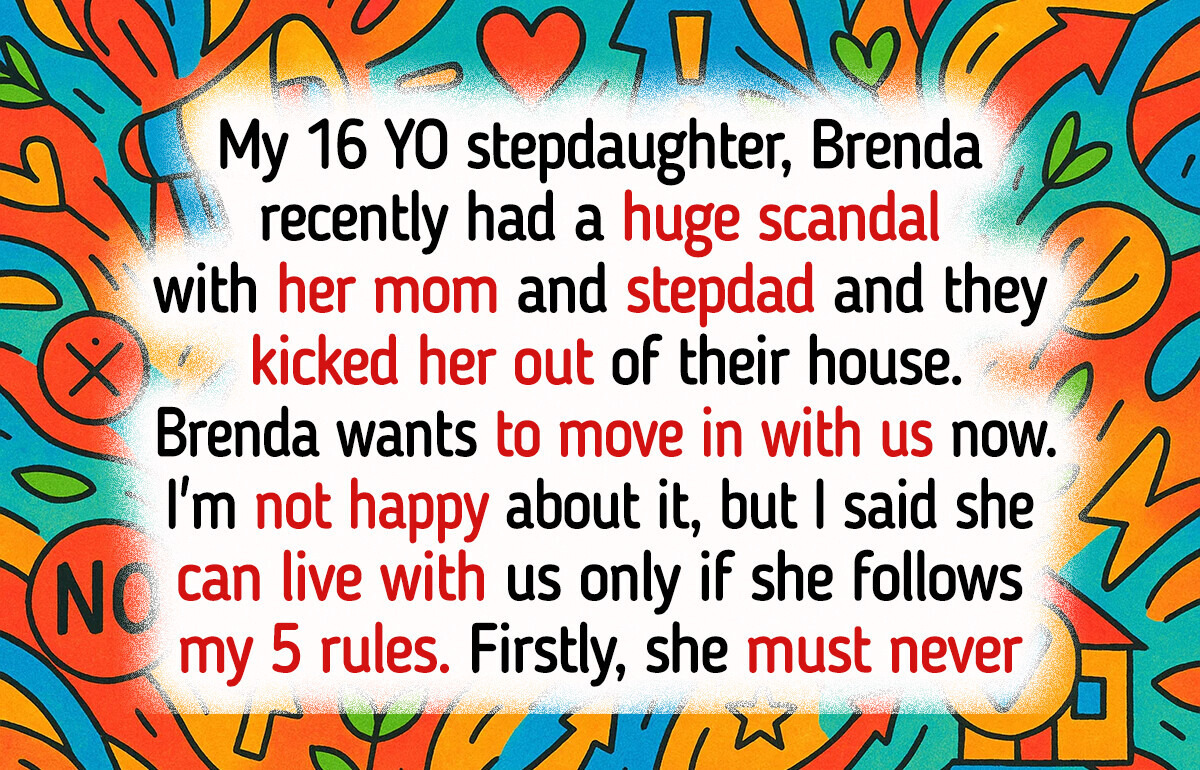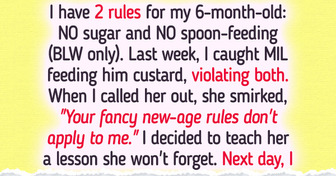Firstly, as a huge animal lover, I belive having the girl give up her childhood pet is extreme and unessecary. I understand you won't want to deal with the fur and all but teenagers are hard to deal with. They need a close friend they can trust and the cat is who this girl needs.
I Refuse to Let My Stepdaughter Move In With Us Unless She Obeys 5 Rules

Martha, 40, sent us a story that left our inbox burning. When a 16-year-old girl gets kicked out by her own mother, most people would say, “Of course she should stay with family.” But what if the only family left is a stepmom who runs her home like a private fortress?
This story isn’t just a clash of generations — it’s a teenage girl begging for shelter, and a woman with a list of non-negotiables. One of them? Get rid of the cat she’s had since she was four. Because, quote: “I won’t deal with cat fur or feces in my house.”
The rest of the story? It escalated quickly. Click through, but brace yourself — you will have an opinion. Probably a loud one.

Here’s Martha’s letter and a plea for advice:
Hi Bright Side,
My name’s Martha, I’m 40, and I’m married to Paul, 49. This is a second marriage for us both, Paul has a daughter with his ex.
My 16 YO stepdaughter, Brenda, recently had a huge scandal with her mom and stepdad and things got so bad that they kicked her out of their house. Brenda wants to move in with us now. I’m not thrilled about it, but I feel pity for the poor teen, so I said she can live with us only if she follows my 5 rules.
- Firstly, she must never bring any pets in my house. She has a pet cat, who’s been with her since she was 4, but now she will have to either ask someone else to take him or leave him at her mom’s house for good. I won’t tolerate cat’s feces, fur and mess in my house.
- Second rule — no friends, boyfriends or other people in my house. She can meet her friends whenever she wants to, but she’s not allowed to bring them to my place. Side people aren’t welcomed in my sanctuary.
- Third rule — she has to be home by 6 PM every day, no exceptions. I don’t care if it’s a weekday or weekend. If she lives under my roof, I want her home early. This isn’t a hotel.
- Fourth rule — she must ask permission before using any of our stuff. I don’t want her touching my kitchen appliances, our TV, or even the washing machine unless she checks with me first. I don’t like people messing with my things.
- Fifth rule — she has to eat what I cook, when I cook it. I’m not running a restaurant, and I’m not going to cater to teenage moods or food preferences. If she skips meals, that’s on her.
Brenda literally cried when I told her about the rules. She said it’s “like a real prison” and that I’m “worse than her mom.” But I’m not bending. My house, my rules. If she doesn’t like it, she can figure something else out.
My husband says I’m being too strict, but he’s not the one who’ll be dealing with the mess, the drama, and the attitude. I’ve worked hard to make our home peaceful, and I won’t let a teenage storm blow that up.
So, am I the bad guy here? Or am I just setting healthy boundaries?
First of all, we want to thank Martha for being brave enough to share her story with us — and with all of you. It’s never easy to speak publicly about private family struggles, especially when they’re messy, emotional, and full of difficult decisions.
We appreciate your honesty, Martha, and we understand how hard it can be to navigate the complicated dynamics of a blended family, especially when teenagers and past wounds are involved.
That’s why we’ve put together 4 psychology-backed pieces of advice. These suggestions aren’t about telling you what to do — they’re here to help you see the situation from a few different angles and, hopefully, find a way forward that’s healthier for everyone involved.
1. Set boundaries, not walls.
It’s healthy to have house rules — but when they feel like punishments or ultimatums, they create more resistance than respect. Try shifting from rigid rules to flexible boundaries that are based on mutual understanding. For example, instead of banning her cat entirely, could there be a compromise like keeping the cat in her room?
2. Remember: teenagers thrive on autonomy.
Adolescents crave some level of control over their lives. Excessive restrictions (like banning all friends or enforcing strict curfews) can backfire and lead to rebellion or withdrawal. Giving Brenda choices — even small ones — can make her feel more respected and less like a prisoner in her new home.
3. Don’t skip the emotional check-ins.
Behind every teen tantrum or cold silence is usually a lot of fear, sadness, and confusion. Brenda’s been rejected by her biological family — that’s not just dramatic, it’s deeply traumatizing. She needs structure, yes, but she also needs to feel emotionally safe. Even a 10-minute daily check-in can make a big difference.
4. You and your husband must be a united front.
Disagreements between stepparents and biological parents are common — but the worst thing for the child is when the adults aren’t aligned. Have a private, honest conversation with your husband about what your joint goals are for Brenda. Unity, even with different parenting styles, creates emotional security for her.
And here’s a story of another stepmom. A careful, protective one. Someone who took it upon herself to make her home feel safer, so she installed cameras.
One of them was in her teenage stepdaughter’s bedroom. The woman swears her intention wasn’t to invade privacy — she says it was about safety, accountability. But when her stepdaughter discovered the camera, the fallout wasn’t just emotional — it was explosive. And the consequences?
Let’s just say: things in the stepmom’s household have turned to one big catastrophe. Read the woman’s letter here to find out the details of this story.
Comments
My 16 year old daughter moved into her own flat, her father paid her the maintenance money he'd never paid me and she worked after school, waitresses and cleaning. I bought her a washing machine and helped her out. Why not help her move into her own place and be independent?
You are running your home like a prison, you married her father knowing he had a child, she was part of the relationship. If you had a cat for 12 yrs who was your comfort when parents divorced and both moved on, that animal is her heart. You are a cold callous B sorry but you are a nasty piece of work, why can't she bring friends home, and be out past 6 she isn't 6 yrs old, also at 16 she should be able to make herself something to eat and clean up. Stop being a mean step mom
Related Reads
I Refused to Split My Son’s Inheritance With My Other Son

13 Stories That Show Just How Twisted Life Can Get

My Mother-in-Law Crossed a Serious Line With My Baby—I Made Her Pay

People Share 15 True Stories That Will Send Shivers Down Your Spine

12 Spine-Chilling True Stories About People Who Listened to Their Gut Feeling

10 Riddles and Short Detective Stories to Test Your Logic

13 Kids Whose Sudden Jokes Made Their Parents Turn Red in Public

12 Stories That Capture the Sweet and Sour Memories of Blended Families

My Boss Publicly Shamed My Small Charity Donation—So I Revealed Exactly How Much He Gave

14 Stories From Cleaners That Are Wilder Than Any Movie Script

I Refused to Pay for Our Valentine’s Dinner—Then I Learned the Heartbreaking Truth

I Refused to Talk to My Parents After They Chose My Ex-Wife Over Me




